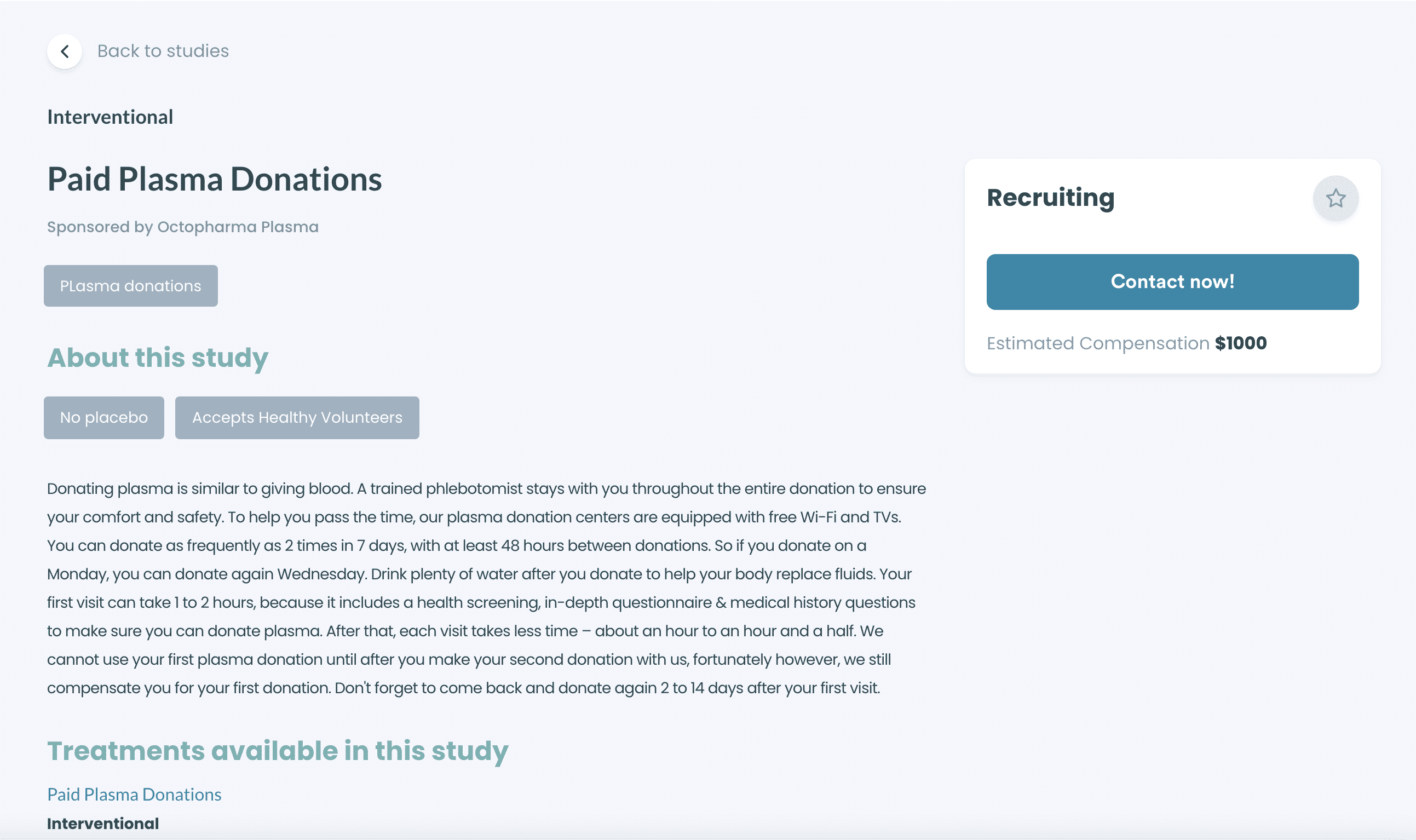Can You Donate Plasma If You Have Seizures?
Did you know that you can donate plasma and receive cash for it? Before you get too excited about easy money, it's important to note that you have to be in good health to be a viable donor. Serious health conditions may preclude you from donating plasma, blood, or any other organ for that matter.
Apheresis, plasma donation, is often referred to as 'the gift of life. By donating your plasma, you help save a life or two. You get a chance to make an impact on someone's life and get compensation for it.
You need to meet a set of conditions before successfully donating plasma. Nevertheless, you might encounter hurdles in your application for donating plasma. DoNotPay helps you find the donor center near you and enables you to understand whether or not. Sign up now and utilize our Clinical Trials product for a smooth donation process.
Why Should I Donate Plasma?
Before setting out, you need to understand what plasma is and why you should donate it.
Plasma is the liquid part of human blood, free of blood cells, but still holds blood protein and other blood components. Plasma makes up around 55% of human blood.
Plasma is used to boost the blood volume of a patient in need. The liquid helps patients suffering from burns, shock, and trauma prevent further shock and aids in blood clotting.
help save the lives of people with rare health conditions, whose only treatment options are plasma protein therapies. If you donate your plasma now, it will be used for any of the following treatment options:
- Clotting factors
- Hyperimmune globulin
- Immunoglobulin or IVIG
- Albumin
- Alpha-1 Antitrypsin
The table below shows some of the benefits of donating blood plasma.
| Plasma can't be synthetically created | Plasma is a crucial material source for a variety of plasma-derived medications that treat as well as prevent life-threatening illnesses, diseases, and conditions. Plasma cannot be synthetically produced or created in the laboratory. If you donate your plasma, you make the above medications possible. |
| Plasma donation saves lives | Plasma-derived medicines are normally used globally to prevent or treat serious diseases in multiple therapeutic areas such as pulmonology, infectious disease, neurology, shock and trauma, hematology, and immunology. By donating your plasma, you help to save as well as improve the quality of life of thousands of individuals. |
| Donating plasma is rewarding | The majority of plasma donation centers appreciate their donors, and so they compensate them for their time and effort. The compensation varies depending on your location. More significantly, by donating your plasma, you give people a chance to enjoy a better quality of life, an unparalleled feeling. You become a hero to countless people around the globe. |
Besides saving lives, you will get compensation for the blood you donate. Technically, you are not paid to donate blood. However, you will receive a token of appreciation for the plasma drawn from the blood. You will get a reward of anything between $30 and $60 per donation session.
What Is the Eligibility Criteria of Donating Plasma?
Plasma drawn from your blood is transfused to a needy patient. Needless to say, you cannot donate blood if you have a blood-borne infection.
The American Red Cross Society has set different requirements to be met for whole blood, platelet, and plasma donation. To donate plasma, you need to meet the following standards:
- Must be feeling well and be in perfect health
- Must be at least 17 years old
- Must weigh at least 110 lbs or 50 kg
Apart from the primary requirements, you also need to be of sound mind to decide to donate plasma. A person who is mentally ill, drunk, or under drug influence cannot donate blood.
You cannot donate plasma if you are under certain medication, such as:
- Pre-exposure prophylaxis (PrEP)
- Post-exposure prophylaxis (PEP)
- Antibiotic treatment (except for acne)
- Soriatane in the past 3 years
- Ever taken Tegison
- Arava, Aubagio, Erivedge, or Odomzo in the last 2 years
- Absorica, Accutane, Amnesteem, Claravis, Myorisan, Propecia, Proscar, Sotret, Thalomid, Rinvoq or Zenatane in the past 30 days
- CellCept in the last 6 weeks
- Avodart or Jalyn in the last 6 months
- Antiretroviral therapy (ART)
Can I Donate Plasma if I Have Epilepsy?
Generally, people who have epilepsy are not allowed to donate blood. There are concerns that plasma blood donation might put the donor at risk of adverse donor reactions such as syncope and convulsions.
Some exceptions allow epileptic people to donate plasma. If you have had no epileptic episodes within the last three years, you are free to donate. You can also donate if you have had no anticonvulsant therapy or seizures for the past three years.
Fainting after donation can trigger epileptiform convulsions, which can lead to actual seizures in an individual with a recent history of epilepsy. Therefore, it is advisable not to donate to avoid putting your life at risk.
How Do I Donate Plasma on My Own?
You can either participate in directed or undirected plasma donation. Directed plasma donation is where you donate to a specific patient. You need to go to the particular patient's institution to make a directed donation.
Undirected donation is a voluntary donation that can be made by walking into a hospital or donation center without benefiting a specific patient. Despite the type of donation you choose, the eligibility criteria are the same. You cannot have your blood tested before offering.
To participate in voluntary donation, find the nearest donation center, and the officer in charge will direct you through the whole process. You should bring your identification documents and any relevant health documents.
Donate Plasma With the Help of DoNotPay
Locating a plasma donation site near you that offers reasonable compensation for plasma donation might take a long time. DoNotPay can help you find a donor's center that works for you, negotiate for reasonable compensation, and guide you through the entire process.
Here's how you can use DoNotPay to become a plasma donor:
- Search "plasma donations" on DoNotPay and find the nearest donation clinic through our clinical trials product.

- Select the "Contact Now" button to learn more about eligibility criteria, contact the clinic with questions, or sign up for first-time donor bonuses.

- Verify your information and submit your inquiry! DoNotPay will contact the clinic on your behalf and make sure your questions get answered.
Why Should I Use Services from DoNotPay?
DoNotPay helps you find clinical trials around you that will let you know if you can donate plasma if you have seizures and information on any other limiting factor of plasma donation. Our clinical trial product allows you to participate in life-saving activities fast, easily, and conveniently. We work with government entities and private companies to simplify all long processes for you.
Sign up today on our website and enjoy the following services and more through your browser:
- Access clinical trials near you
- Find Lost Items
- College Fee Waivers
- Notarize Documents
- Tourist Visa Guide
- Notice of Intent To Homeschool
 By
By